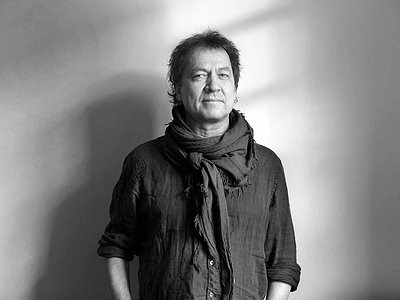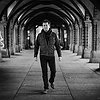Part 1
Name: Nils Petter Molvaer
Nationality: Norwegian
Occupation: Trumpet Player, improviser, composer, producer
Current album: Infolding with Spin Marvel; Switch
Labels: ECM, Okeh, Rare Noise, Sula
Bands: Spin Marvel
Musical Recommendations: Since I I like singers, I would like to mention 2 Norwegian vocalists. Emilie Nicolas and Frida Ånnevik with In the Country (Skogens sang). And anything with Morten Qvenild and In the Country.
When did you start playing your instrument, and what or who were your early passions or influences?
I got my first trumpet when I was 5 or 6 years old. My father gave me an old fashion gramophone and two 78-records. One with Billie Holiday and one with Louis Armstrong. My favourite was Billie Holiday, so I guess she was my first influence. But when I was asked what I wanted to play, I said the trumpet. So Armstrong was also an influence.
For most artists, originality is first preceded by a phase of learning and, often, emulating others. What was this like for you? How would you describe your own development as an artist and the transition towards your own voice?
It is, as you put it, a process. I have been through many phases, and there are so many references … it is hard to mention them all. Trumpet-wise, I can mention Palle Mikkelborg, Miles Davis, Jon Hassell, Don Cherry and Chet Baker. But maybe even more just the sound of, for example, the shakuhatchi flute, ney flute, duduk and some other Instruments which are close to the voice, as well as the traditional music in which they are used. Good singers have also been a great influence on me. I sort of made peace with my trumpet in the late 80s. And I focused on getting a sound which I felt comfortable with. I guess it's a never-ending process, though. Everything comes from something, so I'm still searching.
Tell me about your instrument, please. How would you describe the relationship with it? What are its most important qualities and how do they influence the musical results – and possibly even your own performance?
I play an Eclipse trumpet now. It is made in Luton UK, and for me it is a great instrument. I like it, when a trumpet has an open, warm sound and a good response. I can't exactly say how it influences the musical result, except that it is the instrument I play on. On the electronic side, I use a good preamp and a mix of software - from Native Instruments mostly - as well as some hardware. Pedals like the old Whammy, just a volume pedal, and a couple of expression pedals and sometimes a wah wah. For me, these are tool which can modify the sound of my instrument, create contrasts. I always liked contrasts.
Many artists feel as though, at some point, certain people gave them the ”permission to do certain things”. How was that for you – in which way did the work of particular artists before you “allow” you to take decisions which were vital for your creative development?
I guess that hearing Possible Music (Eno/Hassel) was a groundbreaking experience for me. I don't know if it is correct to say that they allowed me to do certain things (laughs) … But it was a great inspiration at the time.
What were some of your main artistic challenges when starting out as an artist and in which way have they changed over the years?
In the beginning I believe I didn't use space as much as I do now. It is something about being young and restless. As I grew older, I became more aware of the importance of silence in music. The importance of notes you don't play, and that the notes you play need to be important.
What do improvisation and composition mean to you and what, to you, are their respective merits?
Composing music comes out of improvisation. You need to improvise to create. In the studio you can edit and change … which can be a good thing. Start with a sound, a groove or whatever. When you improvise live, what you do is there forever. But both composing and improvising are about interacting for me. Either with another musician or a soundscape of some kind.
How do you see the relationship between sound, space and performance and what are some of your strategies and approaches of working with them?
That's a big question. I guess people have written thick books about it. Accept the space and then use it, whether it is a forest or a basement cellar or a church.
Derek Bailey defined improvising as the search for material which is endlessly transformable. Regardless of whether or not you agree with his perspective, what kind of materials have turned to be particularly transformable and stimulating for you?
Again, a huge question. I kind of agree with Bailey. For me, improvisers have a vocabulary and it is as different from person to person as their personality. For me, improvising is to interact with a sound, a noise a chord, another human. And I do that with my vocabulary.
Purportedly, John Stevens of the Spontaneous Music Ensemble had two basic rules to playing in his ensemble: (1) If you can't hear another musician, you're playing too loud, and (2) if the music you're producing doesn't regularly relate to what you're hearing others create, why be in the group. What's your perspective on this statement and how, more generally, does playing in a group compare to a solo situation?
I agree. But on statement number one, I would get the other guy/woman a bit higher in the monitor. When you play solo, there is no other musicians to relate to, so it is a complete different situation and can be quite challenging. But I enjoy it. I'm so fortunate that I can do both.






